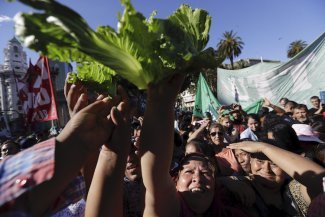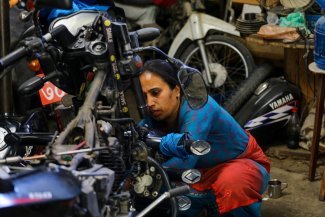The success of the far right in Argentina “cannot be separated from a critical political and economic situation [with galloping inflation] that makes you feel like your income is losing value from one minute to the next. It’s a daily battle through the economy, which causes tremendous insecurity”, says Verónica Gago, here in the picture.
A renowned academic, author of essays such as La potencia feminista. O el deseo de cambiarlo todo (Feminist Power. Or the Desire to Change Everything) and an active member of the Ni Una Menos (Not One Less) collective, Argentinean Verónica Gago has become a reference for the feminist movement within and beyond the borders of her country. In this conversation, we review the situation currently faced by grassroots feminist movements, impacted by the complex political, economic and social situation in Argentina.
On 28 September, feminists took to the streets across the country in protest at the candidacy of far-right politician Javier Milei, the front-runner for the presidential elections on 22 October. How did this march come about?
In the weeks following the PASO [primary elections in August], Milei repeatedly singled out the feminist and LGBTQI+ movement as the main enemy, attacking abortion rights and ESI [comprehensive sex education] in schools, and attacking public education in general. During the assemblies, we recognised the importance of going out on the streets to respond to this discourse, and we chose 28 September, a date already established as a day of action for the right to abortion. It was a gesture of vitality and unity: putting bodies on the streets as the feminist movement knows how to, with a huge amount of hard work and coordination.
It is important that not only did we respond to Milei’s neoliberal conservative offensive but also to the other right-wing candidate [Patricia Bullrich], who has a whole law-and-order discourse in which she calls for a celebration of repressive forces. We also put a spotlight on the issue of the economic violence that’s associated with the IMF and structural adjustment, which particularly affects women who are in charge of caring for their homes and their neighbourhoods, at a time when over 40 per cent of the Argentine population is living below the poverty line, and worse still, 56 per cent of children are poor. It is a dramatic and unprecedented situation. That’s why the march went beyond the abortion issue on that day, by doing what feminisms do, which is to link sexual and reproductive rights issues with economic issues. We managed to sew the two issues together and I think it was the only organised anti-fascist response after the election result.
In the 13 August elections – the primary, open, simultaneous and compulsory elections (PASO), which determined the presidential candidates for the 22 October elections – Milei emerged as the winner. How does Ni Una Menos interpret this result?
Milei was the most voted candidate in the PASO, but the vote was split three ways: the ultra-right in first place, the right wing in second place and, in last place, the government candidate and current minister of the economy, Sergio Massa. That Milei, an ultra-liberal reactionary and denialist, should take first place was a shock: people knew he was on the rise in this time of crisis, but everyone was surprised.
This electoral result cannot be separated from a critical economic and political situation, with inflation exceeding 120 per cent a year, making you feel like your income is losing value from one minute to the next. It is a daily battle through the economy, which causes tremendous insecurity: that is the main political affliction we are dealing with. Inflation is driving what is happening and pulverising everything else.
The feminist campaign is centring on a word often used by Milei in his speeches: freedom. Why is this a key issue?
Milei speaks of freedom in a neoliberal sense, which translates as his proposal for the dollarisation of the economy, the free sale of human organs or the offensive against public education and health in the name of market freedom. He argues that privatisation is needed to allow institutions to compete with each other for their ‘customers’ and that families should be given funding so that they can choose which school to go to instead of funding public education.
Although he presents himself as an outsider and rails against the ‘political caste’, he is part of the elite and does not understand what inflation means for the everyday lives of a large part of the population. That is why we wanted to produce a communication campaign contesting the use of the word freedom. It was widely circulated, with slogans such as: “Freedom is your mother being able to retire”, “Freedom is children being able to speak out about abuse thanks to sex education” or “Freedom is being able to rent a place to live without having to pay in dollars”. It seems to me that this campaign gave rise to a collective message, it was appropriated by various organisations and this collective narrative was created by articulating very tangible realities, which were summarised as: “Freedom is ours”.
Milei’s advance is not an isolated case but is reminiscent of the advance of far-right figures in the United States, Brazil and several European countries. Is Milei channelling people’s anguish in these times of crisis and uncertainty?
Of course, he is channelling the sense of insecurity and precariousness. One important factor is that his discourse has struck a chord with a certain young male voter: it channels the sense of insecurity among young men who have taken the gains made by feminism as a scapegoat for their own fears. Milei is proposing to reinstate a figure of authority who shouts and gets angry, and this has some sort of appeal.
It seems that, in a context where the traditional left does not seem to know how to respond to the advance of the far-right, the feminist movement is stepping up and demonstrating its strength...
That’s precisely why Milei, with his discourse, is presenting himself as a counterpoint to feminism. Because feminism has started to politicise relationships and everyday life, and this is something that the left doesn’t even manage to come close to. We do not have solutions for everything, but we are capable of challenging all that is patriarchal, all that is racist, opening up the collective question of how to reinvent these relationships, or how to give value to what has traditionally been unpaid.
When it comes to the securitarian and racist discourse of the right-wing, for example, feminism has a very interesting discussion on all forms of violence. The feminist movement is present in the neighbourhoods and schools where these problems are being voiced and it seems that the right wing have a better understanding of the political power this represents. And while sections of the left-wing and progressive movements continue to undervalue us, the ultra-right wing sees us as its main enemy.
It could be said that one of the features of feminisms is their questioning of what politics is...
Exactly. Feminisms are determined to do politics and at the same time, each time, they open up the question of what it means to do politics. This is an enormous challenge that forces us to make collective analyses, to understand what it means to convert these analyses into concrete proposals and action dynamics and to connect the dynamics of the street with the dynamics of everyday life. For feminism, this is a key methodological question. It is important to take to the streets, because of what it means in terms of public visibility, but equally essential is how we continue to build and how what we build has repercussions on day-to-day organising, with no separation, because we don’t just do a march and then everyone goes home until the next one.
I think it is a great epistemic and political challenge to work from a place of discomfort: to understand that we are not all going to agree, and that conflict is not an impediment to political practice but is part of the political dynamic.
The work Ni Una Menos has been doing on economic violence related to debt, the overexploitation of domestic work, real estate speculation, etc., is very interesting.
Yes, it is. Luci Cavallero and I published La casa como laboratorio (The Home as a Laboratory), focusing on how the home, the domestic realm, has become a central place for exploitation. Capital is expanding its frontier in the exploitation of unpaid or underpaid care work: this was made visible during the pandemic.
The home is a fundamental component in ensuring security in everyday life: if you don’t know whether or not you’re going to be able to renew the tenancy or pay the monthly rent, this uncertainty becomes a major source of instability. The work with the tenants’ rights organisation Inquilinxs Agrupadxs has been very important, a rent law that established certain rules [was recently secured to counter the abuses of certain landlords]. It is no coincidence that, a week after the PASO, the first thing [the right wing did in the Congress of Deputies] was to revise that law: the first thing to be questioned is a regulation designed to protect people without property privileges, a majority of whom are women and LGBTQI+ people.
What other concrete measures are proposed to address economic violence?
Something grassroots organisations have been demanding, and which is crucial, is recognition of the work of community cooks [for which a bill was presented on 5 June]. As underlined by the women from La Poderosa, the organisation leading this initiative, the soup kitchens are currently feeding ten million people in Argentina. And they are calling for this to be recognised as work. There are also very interesting proposals from women land workers. Their peasant organisations are demanding land for the women who work on it, as well as land for productive enterprises in the people’s economy.
In Argentina, feminism has been working hand in hand with the LGBTIQ+ movement. What is your reading of this alliance?
In Argentina, fortunately, the movement is transfeminist. Crossdressers and trans people are a historical reference for the feminist movement. That is why the discussion on trans-exclusionary feminism here was very short-lived: it wasn’t able to gain ground because the grassroots feminism that is talked about and practised here is deeply rooted in social organisations and trade unions, which are transfeminist in their composition. The call for a trans labour quota, for example, has been key, because of its significance in terms of historical reparation and because when transgender people break into spaces from which they have been excluded, such as universities, they bring about a complete reorganisation of that space.













